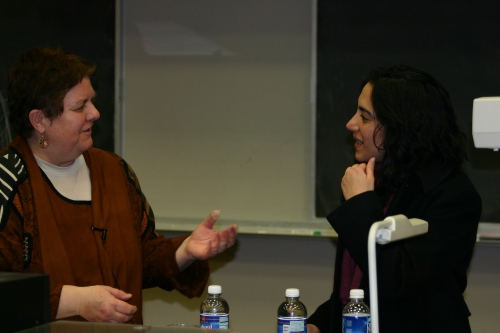|
|
|
|||||



|
I lived in Chile during General Augusto Pinochet's Coup against President Salvador Allende's socialist government. I saw torture and death at a very close range. But I said to myself in those days and even later, "These things happen in a revolution." But, when I visited the first woman I met on death row in Oklahoma, I was appalled at the conditions and utter power of men over women in these situations. I was sick for days after that visit, literally throwing up and unable to get out of bed. It was not because I thought these women are innocent (although some of them are) but because I was suddenly struck that these women were being held and treated in the same degrading and dehumanizing ways we see in times of revolution. I was struck that prison officials are allowed to do this and to keep this a big secret, so to speak, out of the public eye, because the number of women on death row are so few. I thought then, well, I can't go open all the prison doors and force them to act more humanely, so maybe I can write about these women, tell their stories and put them out there so that other people can see what goes on and judge for themselves. Most prisons where women are held on death row in the United States are in totally isolated areas of the state where access is extremely difficult.Within the prisons, death rows, as such, are apart from any contact with the general population. Many women's prisons do not have "death rows" per se and so the women are held in isolation in areas generally known as "the hole."Very few of these prisons have any women working in these areas. The men in charge of women on death row have total control over what goes on there...women on death row frequently lack even the basic necessities...like underpants...I recently wrote a letter for a woman on death row who was asking the Commissioner of Prisons if they (the women on death row) could have one pair of underpants a day, instead of only three pairs a week as they are allowed now - These women aren't asking to be free - they are asking to be recognized as humans.... One woman on death row told me that the hardest thing was convincing herself that she was less than human as everyone was telling her. But, she felt she had to because she knew she would be in prison the rest of her life and to be able to survive from day to day, she could not let herself believe she deserved more. I say, isn't it enough that these women live every day with the thought that they will be executed at some point, do we have to kill them every day.... I hope my book will provoke a lot of discussion and, perhaps, inspire some action... Invite me to come speak to your group or give a workshop or presentation by sending me an e-mail at the address below: Kathleen A. O'Shea (electronic mail, February 28, 2004)  AUTHOR BIO: KATHLEEN A. O'SHEA, a nun for 30 years, is a social worker who does research on female offenders, with an emphasis on women on death row. She is a teacher, writer, activist, and lecturer with a great passion for what she does. She published Female Offenders: An Annotated Bibliography in 1997, Women and the Death Penalty in the United States: 1900-1998, in 1999, and Women on the Row: Revelations From Both Sides of the Bars, which was nominate for a Pulitzer in Mary, 2000. She lives and works at Innisfree Village, a life-time facility for mentally handicapped adults in rural Virginia and is currently working on Hymns of the Revolution (a novel based on her memoirs of Chile, 1965-1973). About the Book: Women on the Row (Firebrand, 2000) This is a book about interconnectedness and the weaving of women's lives. It is both a memory and a memoir of relationships with women on death row and the urgency of the here and now. Specifically it is about one author's experience with women condemned to death and how their lives reflect her own. "I didn't set out looking for connections with women on death row"
says author, Kathleen A. O'Shea. "I was looking for information about
them. Who they are, how they live from day to day. I was writing a history
book, a fairly safe emotionless endeavor. But I soon realized our lives
- all lives - intersect. It's a very Buddhist thing, I think. As I got to
know these women more, what became very clear was not our differences but
how, in so many way, we are the same."
|
